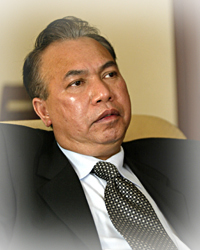Unilateral ceasefire is just a ploy?
 By Isra news desk
By Isra news desk
Security officers in the far South have dismissed an insurgent group’s announcement of temporary unilateral ceasefire in three districts of Narathiwat province as just a ploy to boost its image.
Lt-Gen Kasikorn Khirisri, commander of the Civilian, Police and Military Combined Command, said on July 13 that he doubted the news about the unilateral ceasefire in Ra-nage, Cho-I-Rong and Yee-ngor districts effective as of June 10 to July 10 as declared by spokesman of the Pattani Malay Liberation Movement (PMLM) Mr Gasturi Mahkota was true.
While admitting that he had heard about such news report every now and then, he said there was no way to prove the connection between the insurgent group which initiated the ceasefire and the other group which was still perpetrating violence.
The general further said that there were no signs showing that the ceasefire claim had any effects on the insurgency network in the far South. He also maintained that the government had no policy of negotiating with any of the insurgent groups.
Meanwhile, Colonel Banpot Poonpien, spokesman of the Fourth Army Region, told a Press conference on July 13 that despite the claimed ceasefire announcement, violence suspected to be perpetrated by insurgents continued in the three districts supposed to be covered by the ceasefire announcement, including one bomb attack in Cho-I-Rong, resulting to several people killed and wounded.
Colonel Banpot noted that the news about the unilateral ceasefire followed a news report that a new group of insurgents was established in a foreign country which he declined to name. He said he believed the ceasefire report was intended by the group to show that it had the capability to control the activities of insurgents in the three southernmost provinces.
There were ten violent incidents in Ra-nage, Cho-I-Rong and Yee-ngor districts during the ceasefire period from June 10 to July 10, resulting to six deaths and six others being injured.
However, a source who has connections with some of the insurgents recently told the Isra news team he doubted the ceasefire report was true, saying that there had not been a single instruction to insurgents in the field to scale down their terror activities in the region, including the three mentioned districts of Narathiwat.
But an informed military source, however, admitted that there had been attempts to open up secret talks between the army and the insurgent groups despite the government’s policy of no talks with the insurgents.
While the ceasefire report is yet to be verified, the Isra news team believes that the PMLM might want to hold talks with the Thai government judging from Mr Mahkota’s remark to the media that he agreed to the Malaysian government’s proposal to serve as a go-between for talks between the Thai government and the insurgent groups.
In the same interview, Mr Mahkota reportedly said that he admitted that there was a slim chance that the peace talks would materialize because the Thai government has never wanted Malaysia to intervene in the conflict.
Mr Mahkota also told the Press last year that besides Pulo, there are two other insurgent groups namely BRN and BIPP which are also eager to enter into peace talks with the Thai government.
Despite all the reports – true or untrue – about ceasefire or peace talks, violence continues unabetted.
Gen Waipot Srinual, former permanent secretary of defence and former chief of the National Intelligence Agency, once told the Deep South Magazine two years ago, admitting that peace talks is one of the options to resolve the conflict in the far South. However, he noted that such peace talks would be useful only when the negotiator or negotiators have the authority to undertake the talks “otherwise it will be useless”.
---------------------------------------------------------------------
caption : Mr Gasturi Mahkota
